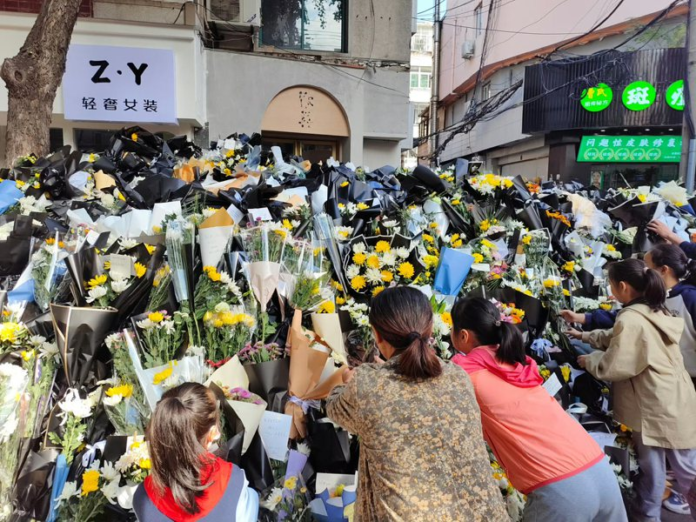Huge crowds in Hefei gather to mourn former premier who was side-lined by Xi Jinping
chinaworker.info reporters
The death of Li Keqiang from a heart attack at the age of 68 has triggered a renewed struggle between the dictatorship’s vast online censorship machinery and the masses whose only semi-legal channel for expression is the internet. Li who was China’s premier from 2013 until March this year, nominally ranked as the second most powerful official behind Xi Jinping in the CCP-state, died in Shanghai on October 27.
In the past two days, at least 10,000 people lined up to pay tribute outside Li’s former residence in Hefei, the capital of Anhui province. A wall of flowers piled up outside the entrance of the building and the city of 8 million people even sold out of flowers. The most common sentence printed on condolence cards with the flowers is a quote from Li Keqiang when he left office, “Heaven is looking at what humans are doing. The firmament has eyes.” This ancient proverb is provocative for Xi and today’s ruling group, almost the equivalent of a curse. Its popularity highlights how people are using mourning for Li Keqiang to express criticism of Xi.
The CCP’s censorship apparatus immediately swung into top gear directing various state and media entities to clamp down on “overly effusive comments” about Li. The secretive censorship directives, leaked and published online, urge all media outlets to be vigilant against comments which “offer exaggerated praise on the surface in what is actually an act of criticism.” An article claiming that Li was taken to the wrong hospital in Shanghai (a Chinese traditional medicine hospital instead of a specialist cardiac care hospital) was removed by censors.
The song by Malaysian artist Fish Leong, “Unfortunately it isn’t you” was shared online by many as a form of protest. This also happened last year when former leader Jiang Zemin died, and Japan’s Shinzo Abe a few months before that, resulting in the song being banned at regular intervals in China. The point is rather obvious and highlights the powerful anti-Xi mood that has built up in China.
A hashtag, “the one who should die hasn’t” was quickly banned. Other netizens have taken to posting videos or quotations from Li Keqiang, also with an implicitly critical edge. One example is news footage of Li visiting Wuhan during the initial COVID-19 outbreak in January 2020, two months before his boss. Another example is Li’s press conference at the NPC in 2020 when he revealed China has over 600 million people whose monthly income is barely 1,000 yuan, which is “not even enough to rent a room in a medium-sized Chinese city.” That speech was part of the ongoing but largely hidden internal CCP power struggle, with Li’s tuanpai faction wanting to puncture Xi’s boastful claims of “eradicating poverty”.
Acute insecurity
The current crackdown on mourning and discussion of Li’s death reflects the acute insecurity of Xi’s regime as it senses massive discontent welling up in society. The CCP is mired in a historic economic crisis after the collapse of the world’s biggest property bubble with living standards falling and the economy on life support. Up to half of under-25s are unemployed, with Xi’s regime suppressing the publication of relevant data. Last year, according to Capital Economics, China’s net household wealth contracted by 4.3 percent. All social classes have gotten poorer, with the working class always the biggest losers.
Universities are of course a particular focus of concern for the government. This is especially after last year’s protests, sometimes referred to as the ‘white paper’ movement, which were sparked by a fatal fire in Xinjiang’s capital Urumqi and accumulated anger against crippling COVID-19 lockdowns. There is evidently a fear today that Li’s death can similarly act as a lightning rod for diverse social and economic grievances. The 2022 protests, the most widespread in China since 1989, began to raise political demands including for Xi Jinping’s resignation before they were swiftly crushed.
According to a report in the South China Morning Post in Hong Kong, Hainan University issued instructions warning students against posting online comments about Li’s death. An unnamed student counsellor at a leading university in Beijing told the newspaper that, “We don’t want students to organise their own mourning events. They could get overly emotional and cause unnecessary turbulence like what happened 30-plus years ago.”
There is an established tradition in China of “mourning the dead to criticise the living”. This is how initially the mass democracy movement in 1989 took shape, following the sudden death of former CCP leader Hu Yaobang. In 1976, although premier Zhou Enlai died in January, it was three months later on April 4-5, the Qingming Festival (a traditional day of remembering the dead), that huge crowds gathered in Beijing’s Tiananmen Square. This was a spontaneous movement against the removal of wreaths, slogans and other items commemorating Zhou, and reflected mass anger against the Maoist regime.
A side-lined figure
Li and the cabinet he led (State Council) were shunted to the side by Xi Jinping as he concentrated ever more power in his own hands. The one-party dictatorship transitioned into one-man dictatorship. This process of heightened authoritarian control, now exacerbated by the severe economic crisis, explains why Li is seen in a favourable light by significant sections of the population. This sympathy is because of who he wasn’t, rather than who he was.
In some ways Li personally came to symbolise the brutality of Xi’s rule. He was reduced to a secondary figure, far less influential than predecessors such as Zhu Rongji and Wen Jiabao who held the premiership before him. Even his own speeches as premier were censored on occasion or pushed to the back pages of the newspapers, as was coverage of public events he appeared at. If the CCP’s number two official is also a victim of authoritarian control, what freedoms can there be for ordinary citizens?
Li sometimes expressed, although in a very guarded and cryptic form, the growing disgruntlement with Xi’s rule in society at large and within sections of the ruling elite, including the 200 or so dominant capitalist-CCP families. This was never close to becoming a serious or coordinated opposition against Xi’s position. Li’s tuanpai faction was largely routed by Xi in the internal power struggle, as graphically demonstrated at last year’s 20th CCP Congress. No tuanpai representatives now sit in the ruling bodies (Politburo and its Standing Committee) and tuanpai veteran Hu Jintao, the former CCP general secretary and state president, was publicly humiliated and “helped” off the congress podium.
What did Li represent?
The interests that Li Keqiang represented within the regime were the remnants of the economic liberal wing, supporters of Deng Xiaoping’s ‘reform and opening’ doctrine (through which capitalist restoration was achieved), and some sections of the capitalist class that resent Xi’s nationalistic capitalist policies of ‘decoupling’, ‘self-reliance’, and escalated confrontation with US imperialism.
That these forces have grown weaker over the past decade is not due to Xi’s political skills or the personal deficiencies of Li and other tuanpai leaders, but reflects the objective social and economic needs of Chinese capitalism for a reinforced dictatorship combined with a more nationalist economic direction. Capitalism in “late-developing” countries like China needs a strong state due to its own inherent weaknesses when competing against older and more developed capitalist economies.
Rather than the bourgeois democracy that exists (and is increasingly shaky) in the older capitalist states, the Chinese capitalists need the protection – from their enemies and themselves – of a dictatorship. Xi’s concentration of personal power as a “new emperor” is rooted in these social contradictions.
Back to the Mao era?
During a visit to Guangdong province in August 2022, Li Keqiang said, “the Yellow River and the Yangtze River will not flow backward,” in a cryptic reference to continuing (capitalist) economic reform and opening as laid down by Deng Xiaoping in the 1980s. Guangdong is seen as the cradle of capitalist restoration 40 years ago. This quote has been widely shared since Li’s death. It implies criticism of Xi’s increased (capitalist) state control and departure from Deng’s so-called reforms. It also shows many different ideas caught up in the swirl of remembrance for Li. While an anti-Xi mood is prevalent, and becoming more explosive, there is as yet no real clarity of what the alternative should be.
Xi Jinping’s authoritarian and nationalist policies are portrayed by some critics as a reversion to the Maoist era. This is not the case for the reason that the Mao regime rested on completely different economic foundations. Xi’s China is capitalist. Until capitalist restoration in the 1980s, the CCP-state was a Stalinist dictatorship modelled on the lines of the USSR and based on an extremely bureaucratic state-owned planned economy, which however was able to introduce important social and welfare reforms – subsequently smashed by capitalism.
Today, Xi’s regime uses certain symbolism and allusions to the pre-capitalist period to justify dictatorship and repression, but does so in the interests of a capitalist economy. It does not mean a return to free basic healthcare, subsidised housing, much less so the abolition of capitalism. Many of today’s mourners are citing Li Keqiang’s speech on reform and opening partly because this idea – Deng’s capitalist restoration agenda – is widely and mistakenly conflated with opposition to Xi’s alleged ‘Maoism’, which in turn is seen as dragging China back to poverty and backwardness by significant layers of the population.
Marxists pay close attention to the power struggle inside the CCP-state, because it is a partial – very distorted – gauge of the huge social pressures building up in Chinese society. None of the CCP’s factions or leading figures represent a way forward and none are on the side of the working class. Their struggle is over how to manage the fortunes of Chinese capitalism, including how best to sustain the dictatorship and prevent revolutionary challenges.
With the measures it has taken, Xi’s regime may successfully contain the political fallout from Li Keqiang’s death and prevent this event from sparking mass incidents. But the further build-up of explosive social discontent is an inevitability based on China’s dire economic trajectory and the increasingly brutal conditions of dictatorial rule.




